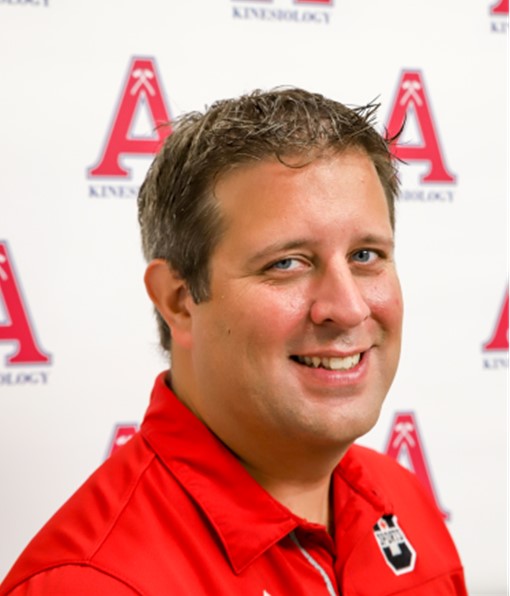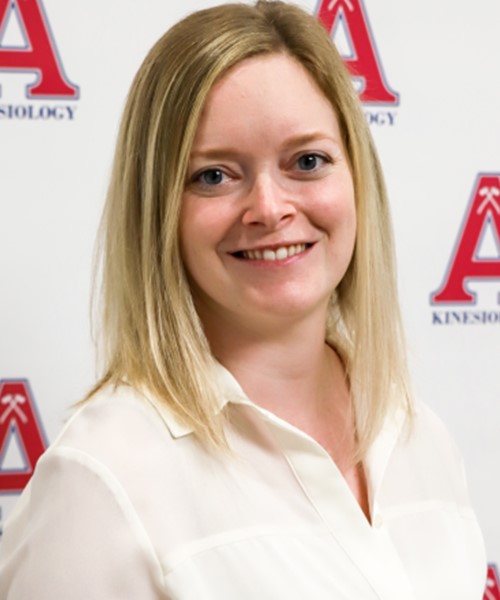Athletic Therapy Option
.

![]()
![]()

Process Details:
1. Bachelor of Kinesiology students who have completed or registered in KINE 2413: Human Physiology 1 can apply.
2. Information Presentation (Session PDF)
3. Complete the application by the deadline.
4. Students will be invited for an interview.
5. Students are notified of application status.
Dates:
February 6, 2026 – Application Deadline. Must be sent to kinesiology@acadiau.ca by 4:30pm AST.
February 23 to March 6, 2026 – Interviews. Links will be sent to students to schedule their interview.
Mid-March – Students notified of application status.
Application:
Please follow the directions carefully as incomplete applications will not be considered. Completed applications and CV/resumes are to be sent as attachments in an email sent to kinesiology@acadiau.ca (DO NOT SEND AS SHARED FILES). Applications received after the deadline will NOT be considered.
APPLICATION FORM
Below please find a term-by-term course plan for students who started the Athletic Therapy option in 2025:
2025-2026 Course Plan for BKIN (Athletic Therapy Option)
AT Handbook:
The Athletic Therapy student handbook is designed to assist AT students with their degree option and is available on Acorn. The Academic Calendar takes precedence over all other publications. Interpretation of regulations or requirements is made by a Dean or the Registrar and is open to written appeal to the Admissions and Academic Standing Appeals Committee.
Dress Code:
The Athletic Therapy dress code includes an AT Polo and Khaki pants / shorts. There will be an opportunity to purchase the polo and other AT gear in April each year.
AT students (accepted in 2021) are required to complete the following Practicum courses.
KINE 3500 - Athletic Therapy Practicum 1
KINE 3600 - Athletic Therapy Practicum 2
KINE 4500 - Athletic Therapy Practicum 3
KINE 4600 - Athletic Therapy Practicum 4
AT students (accepted in 2023) are required to complete the following Practicum courses.
KINE 160A- Athletic Therapy Practicum 1
KINE 161A- Athletic Therapy Practicum 2
KINE 260A- Athletic Therapy Practicum 3
KINE 261A- Athletic Therapy Practicum 4
Printable version of the A.T. Code of Professional Conduct
As an Accredited Program of the Canadian Athletic Therapists Association, the Acadia University School of Kinesiology Athletic Therapy Option is dedicated to the development and professionalization of the field of athletic therapy. The Athletic Therapy Option Code for Professional Conduct states the principles of ethical behaviour that are expected in the practice of athletic therapy as a student in the School of Kinesiology Athletic Therapy Option. It is intended to establish and maintain high standards and professionalism for students in the Athletic Therapy program. Students in the Athletic Therapy Option are also governed by the following guiding codes of conduct and ethics documents:
• Canadian Athletic Therapists Association Code of Ethics and Professional Conduct
• Acadia University’s Policy Against Harassment and Discrimination
• Acadia University’s Policy on Sexualized Violence
• Acadia University Non-Academic Judicial Student Code of Conduct
• Acadia Share the Air Policy
• All other relevant policies as it pertains to being a student at Acadia University:
Students are expected to read and become familiar with all documents.
Guiding Program Objectives
The Bachelor of Kinesiology (Athletic Therapy Option) at Acadia University is designed to prepare students for the constantly evolving allied health profession of athletic therapy. Through extensive classroom and practical educational experiences, program graduates achieve entry-level competencies (as guided by the Canadian Athletic Therapists Association’s Competency Framework) that are required to take the National Certification Examination of the Canadian Athletic Therapists Association.
The overall goal of the Athletic Therapy Option at Acadia University is to develop professional and competent athletic therapists who can work as health professionals throughout Canada. Therefore, Athletic Therapy Option students are expected to follow an important code for professional conduct as outlined in this document.
Guiding Professional Standards
Competence
The Bachelor of Kinesiology (Athletic Therapy Option) engages students in the theoretical principles, practical skill development, and experiential opportunities to learn about prevention, assessment, and management of injuries in sport and physical activity. The curriculum for this Program Option was created using the Canadian Athletic Therapists Association Competency Framework as a reference. Athletic Therapy Option students must recognize the boundaries of their professional competencies and the limitations of their expertise. Students should only use modalities or attempt techniques that are within the Scope of Practice of Athletic Therapists and have been covered in classes, labs, or through practicum experiences.
Integrity
When describing or reporting their qualifications, Athletic Therapy Option students cannot make statements that are false, misleading, or deceptive. Once Athletic Therapy Option students join the Canadian Athletic Therapists Association, only then can they make the claim that they are Certification Candidates of the Association. Students must continue to meet the membership requirements of the CATA to be considered a Certification Candidate and must be a member of the CATA for 18 months prior to be eligible to attempt the National Certification Examination.
Professionalism
Athletic Therapy Option students are expected to uphold the professional standards of conduct of the Canadian Athletic Therapists Association and accept responsibility for their behaviour. These professional standards include:
Dual or Multiple Relationships
The role of an athletic therapist is to make decisions with solely the athlete’s health and wellness in mind. Dual relationships refer to any situation where multiple roles exist between Athletic Therapy Option students and the people with whom they work (e.g., family members and/or romantic interests). Athletic Therapy Option students must always be sensitive to the potential harm and/or unintended effects of dual/multiple relationships as these may impair a student’s objectivity or be used to exploit, or be exploited by, the other party. Athletic Therapy Option students will not be placed with a field/clinical placement where a family member(s) plays, or is employed, because this dual relationship may impair judgement. Additionally, Athletic Therapy Option students will not engage in romantic and/or sexual relationships with athletes from a team they are placed with, or any coaches, supervisors, and/or patients because such relationships may also impair judgement or lead to intentional and/or unintentional exploitation. In certain cases, these relationships could also violate an Acadia University policy.
Athletic Therapy Option students are asked to refrain from taking on professional obligations where preexisting dual or multiple relationships could impair judgement. Before assigning practical placements, the Athletic Therapy Option Practicum Coordinator will send an email to the Athletic Therapy Option student cohort to declare pre-existing dual or multiple relationships with any of the field/clinical placements. Students do not need to state the specific nature of the dual relationship but are asked to name the field/clinical site to ensure that the student is not placed in a position where dual or multiple relationships exist. If a dual/multiple relationship arises during the placement, then the student
should contact the Athletic Therapy Option Practicum Coordinator to return to a single role relationship (e.g., switching to another practicum placement) so that objectivity and sound judgement can be maintained.
Necessary Attire
Professional attire applies to attending all practices, working in any of the clinics at Acadia University, off- site external clinical placements, and game coverage. All clothing cannot
interfere with mobility or clinical duties.
a) Footwear - athletic type closed-toe shoes shall be worn in all field and clinical settings.
b) Long Pants/ Shorts – long pants/shorts shall be at least mid-thigh length. Examples include khaki, black, or navy athletic long pants/shorts.
c) Shirts/tops- full length t-shirts, polos, sweatshirts and jackets. Individuals should wear Acadia logos when possible.
d) Game Day Attire: Acadia-issued polo shirts and black or khaki pants as described above. Students working ice sports (e.g. hockey) are also recommended to wear approved anti-slip ice grippers.
Sanitation Considerations & Barriers
Proper cleaning of equipment and facilities (e.g. therapeutic modalities and therapy beds) and hygiene (e.g. washing hands between patients) are essential for the prevention of disease transmission. Students should also be cognizant of their professional duties and remove any barriers (e.g. finger rings, long necklaces, long fingernails) that could interfere with the performance of such duties.
In consideration of the difficulties that exposure to scented products causes individuals with sensitivities and allergies, all students, faculty, staff, employees of any companies working on university property, visitors, and guests of Acadia University, or of members of the University community are asked to refrain from wearing scented personal care products such as perfumes/aftershave, lotions, hair spray and deodorant (Acadia University Share the Air Policy, 2018).
Social Conduct
Athletic Therapy Option students respect that every individual has the right to a safe and respectful environment that maintains the dignity of each individual, free from any form of
harassment (e.g., physical, verbal, psychological, sexual). Students will not partake in any environment or event where hazing or abuse is happening.
The abuse of alcohol and other substances will not only affect the athletic therapy student’s decision making and performance, but also endanger the safety and health of others. Athletic Therapy Option students are to refrain from reporting to any clinical/ field experience under the influence of alcohol or other substances. Consuming alcohol or other substances in hotels or vehicles transporting teams to/from competition while travelling with an assigned team is also prohibited.
Athletic Therapy Option students will represent themselves, their practicum placements, and the University positively by adhering to high professional standards. Athletic Therapy Option students will take this into account when conducting themselves in public and on social media.
Confidentiality
Athletic Therapy Option students will respect the rights of individuals to privacy and confidentiality. Students will at no time discuss or reveal the nature or content of medical
records with anyone outside appropriate medical or performance staff, as deemed appropriate for injury updates. Confidentiality of all medical records and matters regarding athlete care will be maintained at all times.
Harassment and Discrimination
The Athletic Therapy Option promotes a learning environment free of discrimination, sexual harassment, and/or personal harassment. Athletic Therapy Options students are expected to familiarize themselves with Acadia’s Policy Against Harassment and Discrimination, and the Policy on Sexualized Violence. Students are expected to report offenses that they are subject or witness to, to the relevant Acadia Office: report harassment and discrimination offenses to the Human Rights and Equity Officer (equity@acadiau.ca); report sexualized violence offenses to the Sexualized Violence Response & Education Coordinator (svrec@acadiau.ca).
Academic
Athletic Therapy Option students are required to achieve a high academic standard as set forth by the Athletic Therapy Option and the School of Kinesiology as outlined in the Academic Calendar. Students must earn at least a B grade in the Athletic Therapy Core (KINE 3063, 3073, 3413, 3423, 4113, 4123, 4843, 4853), and a C- grade in the Kinesiology Core courses.
Athletic Therapy Option students are expected to inform their professors well in advance of classes that will be missed due to field or clinical coverage. Students are not exempt from scheduled assignments or exams due to absence for field or clinical coverage.


